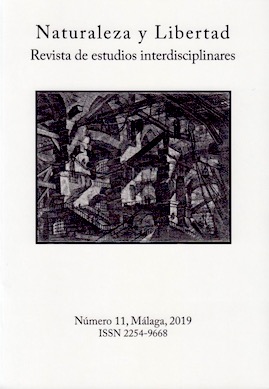LAS INSTITUCIONES CRÍTICAS EN LA ERA DIGITAL
DOI:
https://doi.org/10.24310/NATyLIB.2019.v1i11.5577Keywords:
cultura digital, era digital, realidad, verdad, original, copia, tecnología, fantasía, imaginación, deseo, realismo,Abstract
La revolución digital no solo está suponiendo transformaciones de enorme importancia en formas de comunicación y de relaciones entre personas, sino que implica la posibilidad de cambios de carácter cultural que están operando fuertemente sobre nuestras actuales sociedades de masas, y es necesario preguntarse de qué modo se han de redefinir, en el caso en que resulte posible, el papel de instituciones culturales clásicas como las editoriales, la prensa o las universidades.
Downloads
Metrics
References
B. Bratsberg y O. Rogeberg, “Flynn effect and its reversal are both environmentally caused” accesible en https://doi.org/10.1073/pnas.1718793115 (2018)
J. L. Borges, Pierre Menard autor del Quijote, cuento incluido en varias ediciones de su obra literaria.
G. Bueno, Televisión: Apariencia y Verdad, Barcelona, Gedisa, 2000.
E. A. Burtt, E.A. Los fundamentos metafísicos de la ciencia moderna, Buenos Aires, Sudamericana, 1940.
N. Carr, Superficiales: ¿Qué está haciendo internet con nuestras mentes? Madrid, Taurus, 2017. F. Fukuyama, The End of History and the Last Man. New York, Free Press, 1992.
D. Gelernter, “El estudio del Talmud”, en John Brockman y Katinka Bateson, Eds., Así son las cosas, Debate, Madrid 1996, pp. 227-235.
J. L. González Quirós, El porvenir de la razón en la era digital, Madrid, Síntesis, 1998 (a).
J. L. González Quirós, “Progresar: la tecnología y la tradición antitecnológica”, en C. Mellizo, Ed., Nacer, vivir, morir, Madrid, Noesis, 1998 (b), pp. 25-38.
J. L. González Quirós, Repensar la cultura, Madrid, EIUNSA, 2003.
J. L. González Quirós, y K. Gherab Martín, El templo del saber. Hacia la biblioteca digital universal, Barcelona, Deusto, 2006.
J.L. González Quirós y J. L. Puerta, “Tecnología, demanda social y medicina del de-seo”, Medicina Clínica, 133(16), 2009 (b), pp.671-675.
J. L. González Quirós, “El centauro Quirón”, en Revista Internacional de Tecnología, Conocimiento y Sociedad, ISSN 2174-8985, vol 2, nº1 2013 (a), pp. 99-108.
J. L. González Quirós, “Verdad y vida”, en J. Arana, Ed. Falsos saberes. La suplan-tación del conocimiento en la cultura contemporánea, Madrid, Bibioteca Nueva, 2013 (b), pp. 195-212,
A. Keen, The Cult of the Amateur, Nueva York, Doubleday, 2007.
M. Oakeshott, Moral y política en la Europa moderna, Madrid, Síntesis, 2008.
K. R. Popper, En busca de un mundo mejor, Barcelona, Paidos, 1994.
N. Postman, Technopoly: The Surrender of Culture to Technology, New York, Vin-tage, 2002.
H. Putnam, Razón, verdad e historia, Madrid, Tecnos, 1988.
R. Rorty, Cuidar la libertad. Entrevistas sobre política y filosofía, Madrid, Trotta, 2005.
J. Surowiecki, The Wisdom of Crowds: Why the Many Are Smarter than the Few, and How Collective Wisdom Shapes Business, Economies, Societies, and Nations, Nueva York, Doubleday, 2004.
C. Truesdell, Ensayos de historia de la Mecánica, Madrid, Tecnos, 1975.
Downloads
Published
How to Cite
Issue
Section
License
Those authors who have publications with this journal, accept the following terms:
1. Copyright and licensing information are clearly described on the journal’s web site: all content published in Naturaleza y Libertad is open acces without limit, and are subject to the Attribution-NonCommercial-ShareAlike 4.0 International (CC BY-NC-SA 4.0) license. The full text of which can be consulted at https://creativecommons.org/licenses/by-nc-sa/4.0/
2. It is the responsibility of the authors to obtain the necessary permissions for the images that are subject to copyright. The authors whose contributions are accepted for publication in this journal will retain the non-exclusive right to use their contributions for academic, research and educational purposes, including self-archiving or deposit in open access repositories of any kind. The electronic edition of this magazine is edited by the Editorial de la University of Malaga (UmaEditorial), being necessary to cite the origin in any partial or total reproduction.
3. This journal allows and encourages authors to publish papers on their personal websites or in institutional repositories, both before and after their publication in this journal, as long as they provide bibliographic information that accredits, if applicable, your posting on it.
4. In no case will anonymous papers be published.





18.png)













